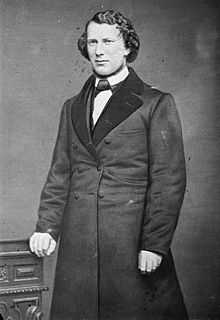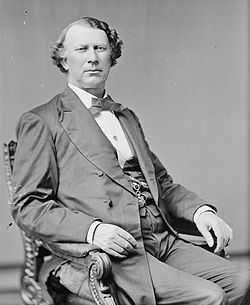John T. Harris
| John Thomas Harris | |
|---|---|
 | |
| Member of the U.S. House of Representatives from Virginia's 7th district | |
| In office March 4, 1873 – March 3, 1881 | |
| Preceded by | Elliott M. Braxton |
| Succeeded by | John Paul |
| Chairman of the Committee on Revision of Laws | |
| In office March 4, 1879 – March 3, 1881 | |
| Preceded by | William Walsh |
| Succeeded by | William C. Oates |
| Chairman of the Committee on Elections | |
| In office March 4, 1875 – March 3, 1879 | |
| Preceded by | Horace B. Smith |
| Succeeded by | William M. Springer |
| Member of the U.S. House of Representatives from Virginia's 6th district | |
| In office March 4, 1871 – March 3, 1873 | |
| Preceded by | William Milnes, Jr. |
| Succeeded by | Thomas Whitehead |
| Member of the Virginia House of Delegates from Rockingham County | |
| In office 1863 – 1865 Alongside James Kenney | |
| Member of the U.S. House of Representatives from Virginia's 9th district | |
| In office March 4, 1859 – March 3, 1861 | |
| Preceded by | John Letcher |
| Succeeded by | Rees Bowen |
| Personal details | |
| Born | May 8, 1823 Browns Gap, Virginia |
| Died | October 14, 1899 Harrisonburg, Virginia |
| Political party | Independent Democrat, Democrat |
| Profession | Politician, Lawyer, Judge |
John Thomas Harris (May 8, 1823 – October 14, 1899) was a nineteenth-century politician, lawyer and judge from Virginia. He was the first cousin of John Hill.

Born in Browns Gap, Virginia, Harris completed academic studies, studied law and was admitted to the bar in 1845, commencing practice in Harrisonburg, Virginia. He was the commonwealth attorney for Rockingham County, Virginia from 1852 to 1859 and was elected an Independent Democrat to the United States House of Representatives in 1858, serving from 1859 to 1861. He ran for reelection, but the seat was terminated from Congress due to Virginia's secession from the Union on April 17, 1861. Harris was a member of the Virginia House of Delegates from 1863 to 1865 and judge of the twelfth judicial circuit of Virginia from 1866 to 1869. On the readmission of Virginia to the Union in 1869, Harris ran for the House of Representatives at a special election held in July, 1869, but was unsuccessful. He was later elected back to the House as a Democrat in 1870, serving from 1871 to 1881. There, he served as chairman of the Committee on Elections from 1875 to 1879 and chairman of the Committee on Revision of Laws from 1879 to 1881. Harris declined a unanimous renomination in 1880. He served as chairman of the Virginia Democratic Convention in 1884 and was a commissioner to the 1893 World's Columbian Exposition in Chicago, Illinois. He died in Harrisonburg, Virginia on October 14, 1899 and was interred there in Woodbine Cemetery.
Electoral History
1870
Harris was elected to the U.S. House of Representatives unopposed.
1872
Harris was re-elected with 61.79% of the vote, defeating Independent Charles T. O'Ferrall.
1874
Harris was re-elected with 73.6% of the vote, defeating Republican John F. Lewis and Independents John F. Early and O'Ferrall.
1876
Harris was re-elected with 73.28% of the vote, defeating Republican Everett W. Early.
1878
Harris was re-elected with 56.46% of the vote, defeating Conservative John Paul.
External links
- John T. Harris at the Biographical Directory of the United States Congress
- John T. Harris at Find A Grave
- The John T. Harris collection (SC#2025) at James Madison University's Special Collections.
| United States House of Representatives | ||
|---|---|---|
| Preceded by John Letcher |
Member of the U.S. House of Representatives from Virginia's 9th congressional district 1859 – 1861 |
Succeeded by Rees Bowen(1) |
| Preceded by William Milnes, Jr. |
Member of the U.S. House of Representatives from Virginia's 6th congressional district 1871 – 1873 |
Succeeded by Thomas Whitehead |
| Preceded by Elliott M. Braxton |
Member of the U.S. House of Representatives from Virginia's 7th congressional district 1873 – 1881 |
Succeeded by John Paul |
| Notes and references | ||
| 1. Because of Virginia's secession, the House seat was vacant for twelve years before Bowen succeeded Harris. | ||
|